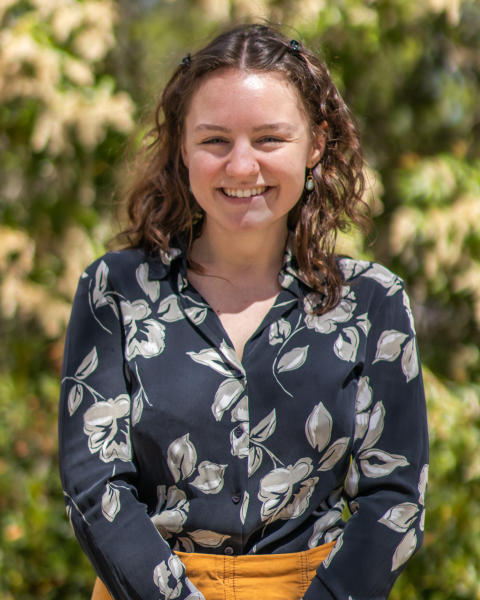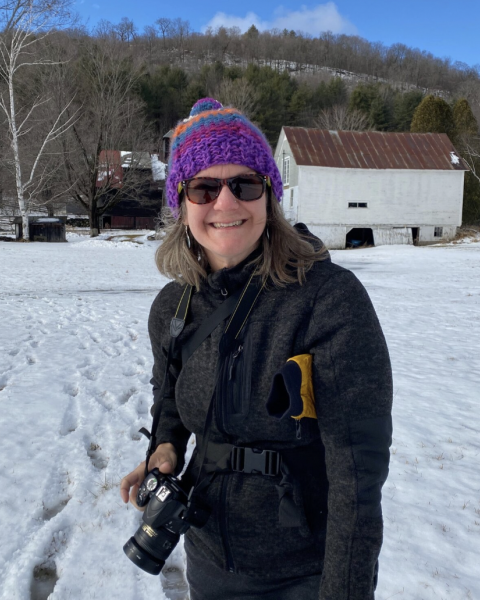Growth Spurts
This interview is part of the NH Food Alliance’s and Ink + Light Creative’s Field Photos Project, a photo-interview series telling the story of New Hampshire’s vibrant and diverse food system. Explore more from the Field Photos Project here >>
Lauren Judd graduated college, taught yoga in Hawaii, started a farm, opened a restaurant, and even lived in a yurt before joining Cornucopia Project in small-town Peterborough, New Hampshire. She is now Executive Director of the organization, whose mission is “planting seeds for a lifetime of healthy eating” through outdoor farm education and interactive culinary programs. Cornucopia Project has blossomed into a model nonprofit in the farm to school movement, specifically in the Monadnock region.
I spoke with Lauren about the importance of diverse options for young people who want to explore their passions. She discusses how collaboration with the local community and organizations with similar values helped Cornucopia Project flourish through the pandemic. Lauren aspires to be a support for any New Hampshire school, youth group, or teacher who wants the same opportunity for their own children.
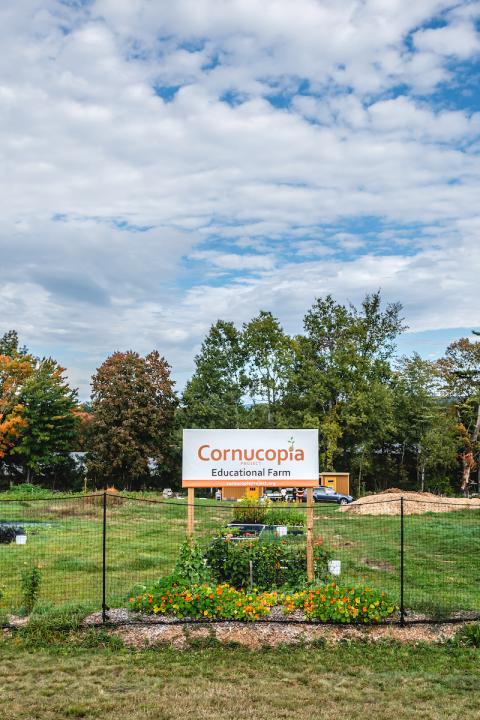
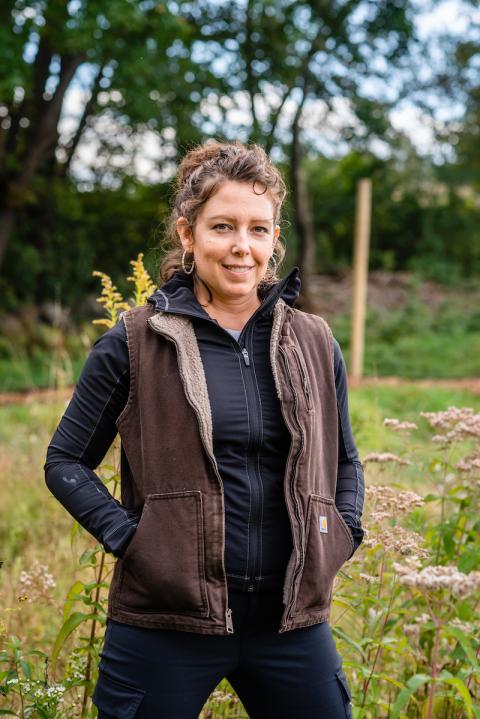
Daisy Young (DY): Tell me a little about Cornucopia Project and how you got involved.
Lauren Judd (LJ): Cornucopia Project is a 501 (c) (3) educational nonprofit primarily focused on teaching youth about where food comes from and how to grow and prepare it. We mainly talk about produce and connecting that with how to meet our nutritional needs by actually growing the food ourselves. It’s a hands-on approach.
There are so many different ways to look at a story of how you got to where you are, and different pieces stand out over time. About ten years ago, I was volunteering for the Brattleboro Food Co-op. Some of my volunteering there was teaching young kids how to cook in their fabulous community kitchen. I realized that doing this was connecting me with my skills and interests. I could design programs and expand this work for a community. It has been a track I have been on for a long time, working with several nonprofits throughout the U.S., it was just a matter of time until I landed in the right place.
Cornucopia Project blends all of the things that inspire me. It is that place, that container, to hold all these different interests that I wanted to pour myself into. Cornucopia Project acknowledges our natural environment, how to utilize that space sustainability, how to eat well and nourish ourselves, how to care for ourselves and each other. Cornucopia is holding everything that I really hold dear to my heart, so I’ve dug into this work for five years.
DY: How did Cornucopia translate these values in the face of the pandemic?
LJ: What’s unique for us is our engagement with youth, especially with the institutionalization of farm to school programs. Our state had different regulations than other states and the federal government at times. Navigating the changes was a challenge for everybody. Cornucopia Project has established a level of trust with the schools that allowed us to proceed with many of our programs throughout the pandemic.
Our Board of Directors and staff showed remarkable resilience during the past two years. Their flexibility and passion for the mission made all the difference.
Right now, we are rediscovering farm to school education and what the scope of our work can encompass following an increase in interest from schools throughout New Hampshire. Cornucopia is merging programs that were developed out of the pandemic with our original programs to create turnkey opportunities for diverse youth groups. We are taking the best of all we’ve learned and uncovered during a challenging time to grow our impact.
DY: What about programs that take place inside? How did these activities—like your culinary programs—shift to satisfy pandemic restraints?
LJ: We do some culinary activities outside as part of our school garden program. We always take it from harvest to eating or ‘farm-to-fork.’ We did have a program with some later elementary school children through middle school students, called Cool Chefs, that was an indoor program. That was happening in the Family and Consumer Science classrooms at the two middle schools. We were not able to do that because the school buildings had been closed to the public and for any extracurricular activities. We made a quick switch thanks to the work of our Culinary Committee, and created a kids cooking kit. This was happening at a time when home meal kits for adults were becoming popular. So we thought, everyone we know is trying these, so why don’t we do it but only include local food producers?
We translated the in-person classes into a take-home kit for kids. This is a program we have kept going post-reopening. We feature local produce and ingredients and the meals reflect foods that are seasonally available. We had requests to do it once a month or even a meal-kit subscription service. I have to remind people that we are just the little Cornucopia Project here! There’s a lot of excitement around it.
DY: Tell me more about the position local businesses played in making these meal kits. Why did Cornucopia value their inclusion?
LJ: In these meal kits, we had so many local food producers come together to bring forward ingredients, recipe ideas and packaging. It showed the power of connecting in the community for the benefit of all. That way of working pushes against the idea of competition as a way to be successful in business, which is perhaps an outdated idea. I was excited to see how much more we could do together.
Local restaurants struggled during the pandemic. Finding a way to include them and put local food businesses in front of families, to get on people’s radar, was important. Once you get exposed to those local food businesses, you remember that the food in this region and this state is incredible! In the pressure of time, when someone is getting out of work and shopping for a family, it can be a little bit difficult to visit your local farmstand or shop. It’s interesting to find ways to put local products in front of more people in your community and create that access and address these barriers. The meal kit started as a little something for the kids, but it actually revealed this barrier. I’m excited to see how Cornucopia can play a role in creating that access to local food producers for more families because it improves nutrition.
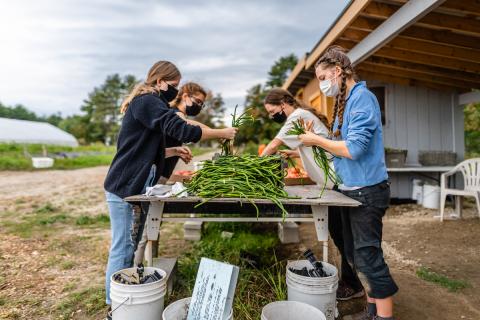
DY: You just mentioned the importance of nutrition in the meal kit program. What other Cornucopia Project programs value cooking and healthy eating?
LJ: All of Cornucopia Project’s programs stem from sharing the importance of nutrition and the joys of growing, preparing and sharing healthy food. Culinary internships are one exciting new way we have connected high schoolers with cooking Local chefs have been involved in our Cool Chefs culinary program for years. We had a class where local chefs would join us to share their favorite recipe of the season and teach the kids how to make it.
A few years ago I connected with the Extended Learning Opportunity (ELO) advisor at the ConVal Regional High School. Cornucopia Project had many connections with local chefs and I wanted to connect everybody together to create a for-credit internship experience for kids who are interested in cooking to parallel our Student Farmer internship at our 2 acre vegetable farm across from the high school. We created a system for how to identify different local opportunities and organize them to connect chefs and high school students for a mutually beneficial experience. Oftentimes, these internship positions turn into paid positions for high school students who are looking to save money and gain deeper involvement with culinary training. This has been rewarding, especially during the pandemic. We are all aware there has been a labor shortage and it’s been critical to create avenues for the restaurant workforce.
DY: How does Cornucopia tackle food inequities? I understand you have collaborated with End 68 Hours of Hunger.
LJ: The smallest answer to that, first and foremost, is that Cornucopia offers no- questions-asked full scholarships to any family that wants to sign up their child for our programs. We don’t turn people away. That is something we can do directly and immediately within our programs. Cornucopia Project has a history of working with food pantries and gleaners as well.
Recently we’ve been working with the ConVal branch of End 68 Hours of Hunger. End 68 Hours of Hunger provides shelf-stable foods to students, to cover that 68-hour period of time where students are out of school and aren’t getting support though a National Meal Program. There is an initiative amongst End 68 Hours of Hunger to introduce new cooking skills and recipes. Our partnership is a natural fit and we at Cornucopia Project have had a great time exploring what we can create for ConVal End 68 Hours of Hunger. The shelf-stable requirement was a challenge. Our work for End 68 Hours of Hunger is important to us not only so we can serve the children who benefit from their work, but also to look at ourselves as an organization and think about how we can adapt, be more inclusive, and enable greater collaboration with other organizations.
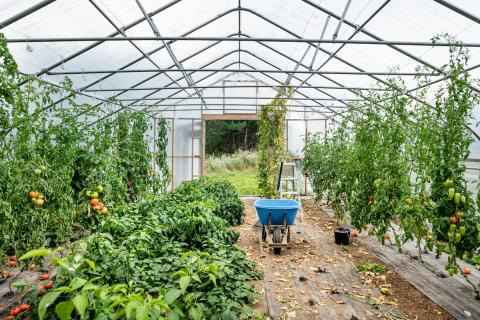
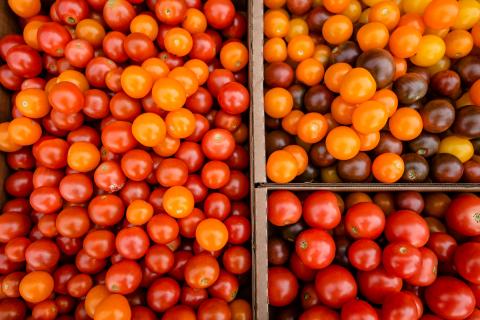

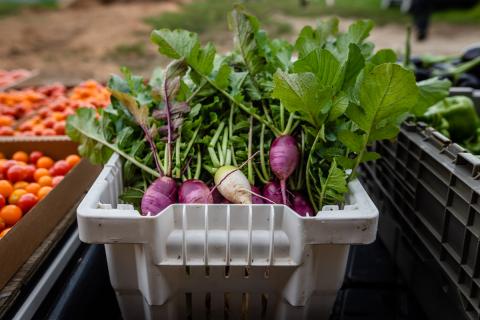
DY: Aside from the pandemic, what challenges has Cornucopia faced and how have you and the team worked to overcome them?
LJ: If you talk to anybody in a non-profit, they are going to say ‘funding.’ The nature of funding tends to be project-focused, so oftentimes we will have funding that will last one or two years. There is no guarantee that the funding will continue to be available in the following years. We have to think of what we are doing from the perspective of how long we have specific funds and what we can achieve within our capacity. We are a small team with a big reach. The question is always: ‘How do we put these funds to the best possible use, to have the greatest, most positive impact in our community?’ I’m smiling because that’s the greatest challenge to have, it’s a wonderful challenge to have.
Another challenge is this piece of land we are farming. Every piece of land has unique challenges and we are working on a micro-farm. What makes it ideal for us is its location because it’s right across from the high school and near the middle school. No transportation is needed for students as they can just walk right across the street. There are some serious runoff issues because of the sloping land. The space that we are using is technically a ‘greenspace;’ there are limitations to what we can do there. Our expertise at Cornucopia Project is in farm-to-table nutrition education, so we have had to learn a lot along the way about how to make a farm. Although it is a challenge, we have a strong team of volunteers—who make up our Farm Committee—that have experience with exactly that. They are of enormous value to us, as are the members of our Board of Directors, who have carried our organization through many phases of development on the farm. Their dedication has ensured that our staff can stay focused on our services, which reached over 1000 children in 2021.
DY: Do you think your strong volunteer base has to do with the community you are in? Why are people drawn to working with Cornucopia?
LJ: I will sing the praises of the Peterborough area and the ConVal district community volunteers. Just look at how many nonprofits are active in the area and you can understand the spirit of the community. It speaks to how people come together and support each other here, which is a beautiful thing.
I do think that we are facing a reckoning around climate and inequality across the globe. As an optimist, I’d like to think that we are turning our attention to problem-solving and creating an outcome that is positive for everybody. I’ve heard that his attention to growing a healthy future has drawn people toward volunteering with Cornucopia Project just as much as a love of gardening and cooking. Through the pandemic, the outdoor education appeal got a bump. Educators have expressed appreciation for and new interest in outside education. Here we had an unprecedented opportunity to share our work with a larger community. As far as outdoor and garden education goes, there is new attention right now and that is drawing new volunteers.
DY: This attention to farm to school programming must be creating exciting opportunities for growth. How do you see Cornucopia’s future development in regard to this focus?
LJ: I and everyone at Cornucopia Project have so many ideas. This is a group of inspired and energized people, who really see a place for Cornucopia Project in the future. I would love to see an opportunity for any school in New Hampshire that wants a school garden to have one.
In the culinary realm, we hope to expand our culinary programs. The ELO program creates opportunities for high school students to train alongside chefs from local restaurants. There’s not a great way to get the word out about that program. The longer we are doing it, we are seeing students come forward with interest. What I would like to see is that anyone who is interested in cooking has access to an opportunity to explore that more deeply. That means more internships and more on the farm culinary programs, which are coming back as we merge remote and in-person projects. As we brought the farm into development, we were excited about being on the farm with the students, harvesting the vegetables, and cooking it right there instead of having to travel indoors to do that.
The big picture answer is anyone who wants to start a school garden, cook with local ingredients, or learn how to grow food, has an opportunity to do that and can find their path with Cornucopia Project.
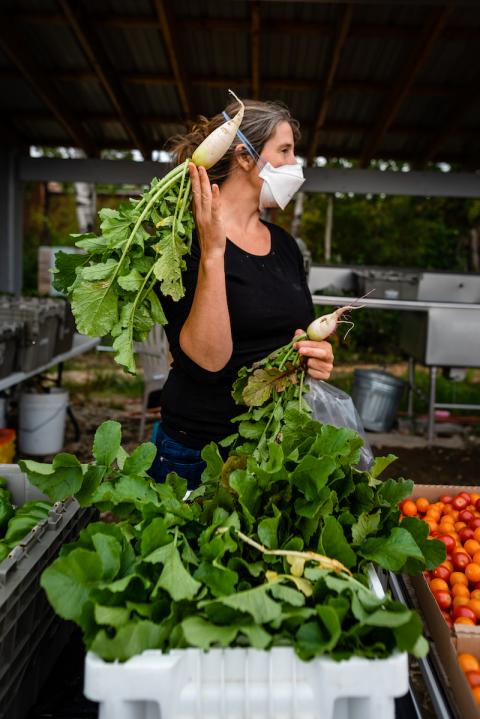
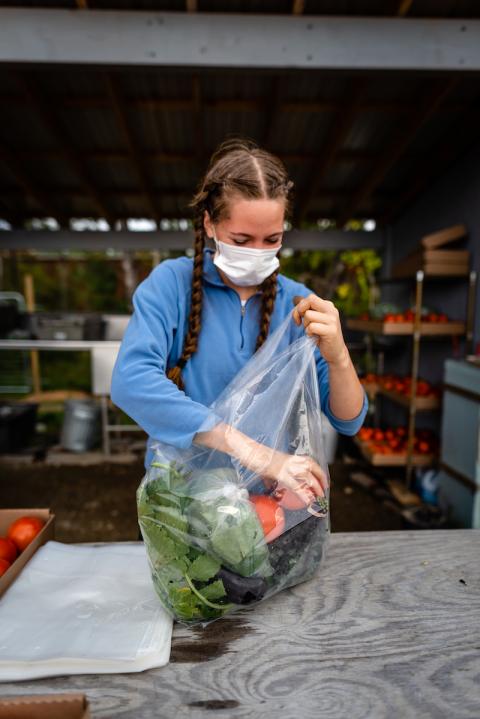
DY: You just spoke about increasing engagement with farm to school programs. Can you tell me about Cornucopia Project’s involvement with the larger Monadnock Farm to School Network?
LJ: The Monadnock Farm to School Network is a branch of the NH Farm to School Network. One of the goals of the NH Farm to School Network is to create more regional networks that would allow for deeper collaboration based on your area, to really push the work forward. There is one in the Laconia area and there are two other networks that have formed. But there was nothing happening in the Monadnock Region.
Cornucopia Project has been in the NH Farm to School Network and NH School & Youth Garden Network for years. Because of our capabilities and our capacities, the Monadnock Farm to School Network is something that we were in a good position to take on. Of course, it aligns with our mission, which is anchored in the Monadnock region, so it was a natural fit for us to initiate this network.
The timing is also right. We received a USDA Food and Nutrition Service Farm to School grant which we are just at the tail end of now. Having been through the whole application process to be part of that national program and also nearing the end of an enormous project with farm to school, we are ready to share with other organizations, schools, and people looking to get involved.
Federal funding for farm to school projects has increased alongside interest. Cornucopia Project is glad to offer assistance with navigating the farm to school journey via the Monadnock Farm School Network.
DY: What will Cornucopia’s role look like in this network?
LJ: Cornucopia Project’s role is to create and hold the space for gathering. This network is for local farmers, school teachers, school administration, and local parents who want to get involved, to connect with each other and start some farm to school activities in their community.
Apart from holding the space, Cornucopia Project is available to answer questions. There are so many questions— ‘How did you go about getting your farm certified to be able to sell produce to the school?’ Then we can directly answer some of these questions that people have, having done this ourselves. Even providing a garden kit to a classroom teacher who doesn’t have a garden yet but wants to test out teaching a garden lesson. Maybe later they will want to build a school garden, if it's something that they really end up enjoying. Cornucopia can provide that and give a turnkey lesson plan and materials to a teacher, so they can see if it is the right fit for their classroom.
We also partner with Stonewall Farm, which is nice because it’s a blast from the past for me. Stonewall Farm is a partner in the Monadnock Farm to School Network, along with the Monadnock Farm and Community Coalition and Food Connects. Together, we are offering professional development opportunities through the network. Teachers can receive their professional development credits while learning about what farm to school is, what are the ways that they can include it in their classroom, and what the benefits are.
The idea is to create a farm to school network in the region where we do have this opportunity in every school, hopefully throughout the state and beyond. Where it is normal, as normal as having a gym or choir practice, to learn how to grow your own food and prepare it, and understand the natural processes in that.
DY: Why do you find it important to build a larger network in our region?
LJ: There’s so much food here, so many skilled local food producers. Right up the road from me, there’s someone who has a cheese cave. You can come to Cornucopia Project as a high school student, or anyone of any age, wanting to learn how to make your own cheese and I will connect you with an opportunity. The network can help uncover more opportunities and to increase awareness. Sharing the thrilling food products of the region with youth improves: nutrition, business, workforce development and community development. The network is a key to weaving the parts together.
So much of what we do is collaborative. I’m always telling people, don’t reinvent the wheel, somebody is doing something out there. If we have a great program we are producing and we want to focus our energy on creating this amazing education tool or whatever it might be, it just works so much better for us to get it out there with more students by sharing.
Farm to school networks exist across the U.S. New Hampshire is unique because of our history in agriculture Every place brings its own different style to farm to school. Cornucopia Project gets calls from people in Arizona, Nevada, New York, Maine, saying ‘Hey, I heard about what you are doing, I saw your website, can you help me get started? We are totally happy to help with that.
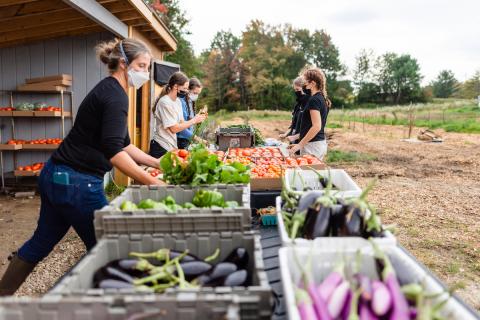
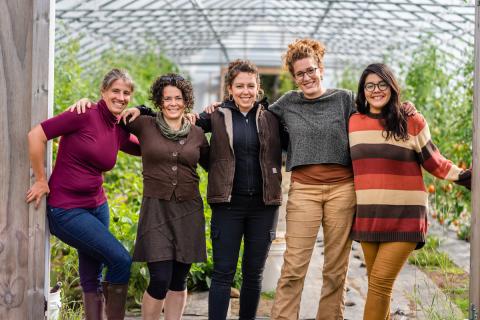
DY: It’s clear that your work with the Cornucopia Project is multi-faceted, fast-paced, and busy. What sustains you in all of this work?
LJ: Every moment that I am working with kids. Every moment. I get the chills even just talking about it. I hear it from all of our volunteers, our programs, and our educator staff. We plan all Winter long and then we get back into the gardens in the Spring, and the magic is always there. It never gets old. Getting out there, working with kids outside in the garden, introducing that new group of first graders to this amazing outdoor classroom. We do student-led style learning, which also brings its own magic. It works, it really works. I believe in the power of showing children how to grow food, and I know the result is that these kids are eating more fresh vegetables and are excited about the outdoor environment. They are excited when they realize they can create things. The ability to create is such an essential, powerful experience to have. Having the privilege of witnessing and enabling that is so inspiring. It really is this ageless experience, where you are always fresh because you are in the act of creating something. We are creating something essential: food. And nourishing food makes everything better.
To learn more about Cornucopia Project’s programs and how to get farm to school education started in your own community, check out the organization’s website. Here, you can also order seedlings to jumpstart your own garden or sign up for their Fall or Summer CSA and support Cornucopia Project’s mission. And be sure to follow along on Cornucopia Project's Facebook and Instagram.
This interview has been edited for clarity and length.


